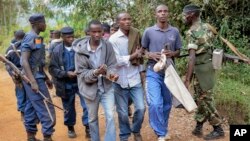Opposition parties said Friday that they would boycott Burundi's elections in protest against President Pierre Nkurunziza's bid for a third term and over concerns that voting would not be fair, escalating the African nation's worst political crisis since a civil war ended in 2005.
Highlighting international worries about the crisis in a region with a history of ethnic conflict, U.N. Secretary-General Ban Ki-moon said voting should be postponed because he was "deeply concerned over the prevailing political and security environment."
But Burundi's U.N. ambassador, Albert Shingiro, said elections would go ahead as scheduled. He told a Security Council meeting that 95 percent of the country wanted the vote and did not want to remain hostage to what he called a "radical minority" that doesn't want to see elections.
Also Friday, the United States said it would place on hold technical assistance to Burundi's electoral commission because of Nkurunziza's election plans.
U.S. State Department spokesman John Kirby said the United States supported the African Union's call for elections to be postponed until all parties can agree on a timetable and necessary conditions for a vote.
The parliamentary vote is due to take place Monday, with a presidential election on July 15. Both have already been pushed back after weeks of protests against Nkurunziza's announcement in April that he would stand again. Shingiro said another postponement would plunge the government into a constitutional vacuum.
Critics of Nkurunziza say he is violating the two-term limit in the constitution and the accords that ended Burundi's civil war. Burundi's constitutional court said the president is eligible to run again because he was elected by parliament, not voters, for his first five-year term in 2005.
Dozens of people have been killed in recent unrest stemming from the election dispute. Several people have been wounded in grenade blasts in the capital, Bujumbura, in the past few days.
The U.N. refugee agency, UNHCR, said Friday that almost 127,000 people, more than 1 percent of the population, had fled to neighboring states, many citing fears about election-related violence.
UNHCR offices in the region "have been noting a steady increase in arrivals of Burundi refugees" as Burundi gears up for voting, agency spokesman Adrian Edwards said Friday in Geneva.
On Thursday, at least 100 students broke into the grounds of the U.S. Embassy in Burundi to seek refuge from violence. The embassy said the students remained peacefully in the embassy parking lot. They had been camping outside the embassy compound for weeks after the government closed their university in April.
Vote 'would not be credible'
Announcing the election boycott by the group of 17 opposition parties, Francois Nyamoya, secretary-general of the MSD party, said voting would "not be credible."
Frederic Bamvuginyumvira said his Frodebu party and other opposition groups opposed the new vote timetable because it was drawn up without consultation, which the government denies.
He repeated calls for the ruling party's Imbonerakure youth wing to be disarmed, echoing comments from Western and African states. The ruling CNDD-FDD denies the youths have been armed.
A group of eight Burundi civil society groups called in a statement for "all Burundians to systematically boycott elections prepared by Nkurunziza who wants to impose himself as a leader in violation of republic laws."
The government has previously dismissed boycott threats, saying the opponents were scared of being defeated at the polls.
The European Union, a major donor, and African neighbors have all voiced worries that the country was not ready to vote.
European foreign ministers said this week they did not expect conditions for a fair vote to be in place in time, such as reopening private radio stations closed during the unrest.
At talks to defuse the crisis, international mediators proposed a delay in local, parliamentary and presidential polls to July 30, but opposition parties stuck to a demand for a three-month postponement, one opposition politician said.
There was no immediate comment from the government or ruling party, which stayed away from the U.N.- and African-mediated talks. The CNDD-FDD said this week it needed to focus on campaigning. The government has promised a fair vote.
Burundi's second vice president, Gervais Rufyikiri, said this week he had fled the country after he was threatened for denouncing Nkurunziza's re-election bid, an allegation denied by the government.
Rufyikiri was believed to be in Belgium. The president's office told VOA that Rufyikiri went there on a mission a few days ago.
VOA reporter Edward Rwena, who is in Bujumbura, said the country's first vice president, Prosper Bazombanza, remained in the country.
Some information for this report came from Reuters.





